牛津上海英语八年级上册 Module 1 Unit 3 Trouble ! (共12张PPT)
八年级上册英语沪教牛津Module1Unit3trouble!(thefunny_6

Homework
1.Each student finish a form of six essential elements and write a story based on it.
2.(Optional) Search the Internet to find more exciting stories of an ordinary career and tell stories in class.
Who
A _______
How
Beginning: The man was _______ _______ _______ ________ inside his coat
Climax: I thought he _____ ______ it, so I ______ him.
Ending: We soon _______ him. Because he just wanted to ______ it to the shop ___ ___ _____, but he ____ _____ his wife to see him.
The teller ___ him money and the man ____ ____.
She ____ a phone call to the police and ____ them to go to the man's flat and ____ him.
The police ____ him as soon as he ___ ___ ___the lift.
story c When Where Who How
Once
As he was going through _______
上海版牛津英语8AM1U3

8A Module 1 My LifeUnit 3 TroubleThe First Period ReadingLanguage Targets:ing the simple past tense to write a diary.ing the adverbs of frequency to describe the action..ing formulaic expressions to organize a diary.4.Learners can know how to help others in an indirect way. Language focus:1. Vocabulary:1) deal, trouble, argument, crowd, steal, hurry, afraid, ever, unusual,purse, quietly2) deal with, wait for, shout at, move through the crowd, stare at, hurryaboard, happen to, hold out, be going on2. Function: They stole my friend’s purse five minutes ago. Teaching aids:1. A recorder, a cassette2. Student’s book 8A page 39.Teaching steps:PRODEDURE CONTENTS METHODS PURPOSEI.Pre-taskpreparation1.Daily talk2. Name the things inhis sack that therobber stole from thepeople Topic;What did you do lastSunday?Bob the robber stole12 things from thesepeople. Can you namethe things in hissack? Can you say whohe stole each thingfrom?Studentswould liketo share itwithclassmatesand willmake theatmosphere ofEnglish.Review the3.Answer the questions.Example:He stole a ball fromthe dog.What do you knowabout…?1.Have you ever beenon a ferry?2.What number do youdial to call thepolice?3.What is a diary?4.Do you keep a diary?5.What do you usually6.write in yourdiary?7.How often do youwrite?simple pasttense and askstudents tolearn toexpresscorrectly inreal life inEnglishHelpstudents knowsomethingaboutdiaries.II. While- task procedure 1. Read the title andthe introduction on thenext page.Topic: Dealing withtroubleIntroduction: Here is apage from Paul’s diary.Paul is writing aboutan unusual thing thathappened to him oneday.2、Learn the new words.3、Learn the article.Tell Ss to look atthe title,subtitle andpictures beforethey read the wholearticle, they canget a general ideaof the topic.Give a short answer tothe question below.1.What do you thinkPaul will writeabout?2.What is the mandoing with the bag?3.Which person isPaul?Ask Ss to read thetext by themselvesand find out thenew words, and tryto guess themeanings byreading the wordsaround them.Help Ssunderstandthe articleeasily.This is partof the skillofpredicting,It is goodfor Ss tomakeintelligentguessesabout whatmight be inthearticle.Develop theskill ofguessingand workingout thelikelymeaning of a4. Look and think5. Exercises D1: Help Paul to complete the letter to Kurt.6. Exercise D2: Find the facts 1.Read the textafter the tape.2..Read the texttogether.3. Match theparagraphs with theirmain ideas.1. Read the texttogether.2. Ask students tofinish exercisesC1, C2, C3.3.Have a check.4.Work in pairs. Askand answer aboutPaul’s diary. S1 asksthe questions and S2tries to answer his orher questions.Later, Paul wrote aletter to hispenfriend, Kurt. Somewords are missingfrom his letter. Useinformation fromPaul’s diary tocomplete the letter.Put one word in eachblank.Work alone or inpairs. Read Paul’sdiary againto find the answers tothese questions.word fromthe study ofitscontext.Check theunderstanding of thetext..Train theSs’ readingskills.Theexercisepracticesusingdifferentforms of thesimple pasttense.III. Post-task activity 1. Retell the story. Suppose you arePaul’s father.Retell the story.To reviewwhat theyhavelearnedIV. Assignment Read and copy thenew words.Workbook 8A, pages11, 12, 18, 19 and20. Go over the knowledge they have learned.教学反思:Second Period Grammar ALanguage Targets:1. Practise the simple past tense and adverbial expression.2. Students can use the simple past tense correctly.Language focus:1. Vocabulary: jump over a stream, blow down your tents, carry guns2. Forms of the simple past tense of irregular verbs.Teaching aids:1. A recorder, a cassette,2. Students’ book 8A page 42Teaching steps:PRODEDURE CONTENTS METHODS PURPOSEI.Pre-taskpreparationDaily talk Topic: A storyhappened on the bus Let students become interested in this topic and make the atmosphere of English.II. While- taskprocedure1.Introduce when touse the simple past 1. Ask Ss when weshould use thesimple presenttense.We can use theRevise thebasic use ofthe simpletense.2.The different forms of the past tense verbs.3.Practise4..Forms of the simple past tenseto refer to thingsthat happened inthe past.Here are somecommon time expressions, e.g.,a minute ago,yesterday, lastweek/month/year.1.Regular verbs:1).We add -ed tothe past form ofmost regular verbsin positivesentences.2).We only add -dto verbs that endin –e.3).We change the -yto-i and add -ed tosome of the verbsthat end in–y.4).Some verbsdouble their finalconsonants when-ed is added,Write the pastforms of the givenverbs.Tips:Verbs ending in avowel + y form thesimple past tenseby adding ‘-ed’,e.g., enjoy ed,stay ed.We form the simplepast tense ofirregular verbsdifferently. We dopast tense.Let thestudentsrememberthe rulesand makesure Ssunderstandthem.Help thestudents torememberthe tips.Tell thestudents weuse thesimple past tense.5. Language Exercises Complete their conversation.plete their dialogue by writing the verbs in brackets in the past simple tense. not add ‘-ed’.We use the simplepast tense to makepositive andnegative sentenceslike this.We can use thesimple past tenseto ask and answerquestions likethis.Structuree.g.I heard theargument.I didn’t hear theargument.Did you hear theargument?Yes, I did.No, I didn’t.Tips:The simplepast tense is thesame for allpersons.Later, Paul toldhis friend Juliaabout thetheft. Here aresome of Julia’squestions andPaul’s answers.Put one or morewords in eachblank. The firstone has been donefor you.1、Last month, Leowent on a schoolcampingtrip. Now, he isshowing Ling somesimple pasttense totalk aboutthings weused to do.Examinewhether Sshavegrasped thesimple pasttense.Train thestudents’speakingability.photos. Work in pairs and role-play Leo and Ling. Complete their dialogue by writing the verbs in brackets in the past simple tense.2、Work in pairs. S1 is a police inspector. S2 saw a robbery in the Pizza Palace. S1 asks about the robbery with the verbs in brackets. S2 uses the pictures and the words given to answer S1’s questions.III. Post-taskactivityComplete thenewspaper report. Work alone tocomplete thenewspaperreport below. Usethe questions andanswers you gave inC1.Work alone or inpairs to completethe newspaperreport below. Usethe correct form ofthe verbs inbrackets.To reviewwhat theyhavelearnedIV. Assignment Workbook 8A, pages23, 24, 25 and 26. Go over the knowledge they have learned.教学反思:Third Period Grammar BLanguage Targets:1.To use the adverbial phrases of time with the simple past tense to showwhen something happened.2.Students can use the simple past tense correctly.Language focus:1. Vocabulary: jump over a stream, blow down your tents, carry guns2. Forms of the simple past tense of irregular verbs.Teaching aids:1. A recorder, a cassette,2. Students’ book 8A page 43Teaching steps:PRODEDURE CONTENTS METHODS PURPOSEI.Pre-task preparation Daily talk Topic:On my way to schoolGet studentsinterested inthe topicII. While- task procedure1.Introduction:the adverbialphrases of time inthe simple pasttense. We can usethe adverbialphrases of time withthe simple pasttense to show whensomething happened.ing lastThe word lastrefers to the week,month, year, etc.before the presentone.3. Using in, on or atwith time.4. Using ago.5.Practise askingand answeringWrite down theadverbial phrasesof time in thesimple past tenseLast month,On Saturday,In 2005,Ten days agoAdverbial phrasescan go after orbefore the mainclause.Tips:We don’t say ‘lastmorning/afternoon/evening’, but‘yesterdaymorning/afternoon/evening’.We use in, on or atwith time phrases.Read the followingexamples.We do not use in, onor at before thesewords: every lastnext this tomorrowyesterdayThe word ago refersto a period of timebefore now. Italways comes afterthe time word(s).Look at thistime-line and readthe questions.Answer questions 3and 4. Then inHelp Ss usethe adverbsandadverbialphrasescorrectly.plete Paul’s diary by using the correct adverbial phrases. pairs, practiseasking andanswering six morequestions likethese.Last Wednesday,what was the date?What was the daysix days ago?What was the datetwo days ago?What was the dayfour days ago?Paul is reading hisdiary. It is now 9p.m. on30 June. CompletePaul’s thoughts byusing the correctadverbial phrases.The first one hasbeen done for you.Examinewhether Sshavegraspedttheadverbialphrases oftime of thesimple pasttense.III. Post-task activity 1.Additionalexercises.Use the simple pasttense to describewhat students did atthe past times.1.Write thefollowingadverbial phraseson the board.two hours agoyesterday lastweekone month ago2.Ask the studentsto write what theydid at those times.To reviewwhat theyhavelearnedIV. Assignment Workbook 8A, pages26 and 27. Go over the knowledge they have learned.教学反思:Fourth Period ListeningLanguage Targets:1. To learn to catch the main information you need while listening.2.To describe a person’s appearance correctly.Language focus:1.Vocabulary: description, rather, baseball2. Functions: It was black and brown in color..He had quite long hair.Teaching aids:1. A recorder, a cassette,2. Students’ book 8A page 45Teaching steps:PRODEDURE CONTENTS METHODS PURPOSE I.Pre-taskpreparation1.Look at thepicturre and answerthe question.2.Review how todescribe a person’s appearance. Question:Who is the man inthe picture?1.Do you stillremember what youlearned in theLISTENING sectionin Unit 1? When wedescribe a person’s appearance, whatdo we usually talkabout?hair colour, hairlength, hairstyle, clothes…2.Now, pretendthat you are Simon.You are telling thepolice about theTo motivatethestudents’interest byguessingthepictures.Helpstudents toknow how todescribe aperson’sappearance.thief. Think about what you will probably say.II. While- taskprocedure1. Listen to therecording. Completesome notes ofdescriptions of theother two thieves.2. Find the twothieves in the line 1.Now you are goingto complete somenotes ofdescriptions ofthe other twothieves. Whatshould you do whenyou need tocomplete the notesof descriptions ofpeople?2.Listen to therecording. Youwill hear one ofthe women, from thestory on page 39,talking to apoliceman. She isdescribing the twoother thieves.Listen carefullyand complete thedescriptions belowby writing one wordin each blank.Thief A: Thief B:Age:Height:Build:Hair:Clothes:Shoes:Letstudentslearn totake noteswhilelistening.Develop thestudents’listeningskill.of people below according to the descriptions. Now use the descriptions in A to help you find the two thieves in the line of people below. Circle the correct numbers.III. Post-taskactivity1.Finds out thesuspect.2.Describe one ofthe yourclassmates. Work in pairs. S1describes one ofthe other suspectsand S2 takes downthe notes and findsout the suspect.Now, describe oneof the your classmates, thenlet others guesswho he or she is.To motivatethestudents’interest byguessingthepictures.IV. Assignment Workbook 8A, page27. Go over the knowledge they have learned.教学反思:The Fifth Period SpeakingLanguage Targets:1. Learn three pronunciations related to the past tense forms of verbs.2. Be able to say the sentences with correct intonation .3. Introduce a historical figure usinthe grammar learnt in this unit. Language focus and difficult points:1. Three different ways of pronouncing the past tense forms of verbs.2. Vocabulary: mend downstairs India press the buttonTeaching Aids:1. Student’s Book 8A page 46.2. Multi-mediaPROCEDURE CONTENTS METHODS PURPOSEI.Pre-taskpreparation RevisionReview three forms of thesimple past tense ofregular verbsHelp students tolearn the followingbetter.II.While-task procedureA: Talk timeA1. /t/, /d/or /Id/Read andcompareA2: Read thesentencescorrectly. There are three differentways of pronouncing thepast tense forms of verbs.Practise saying thefollowing verbs. Try to saythe endings correctly./t/ crossed helpedlaughed pressedasked/d/ agreed realizedcarried turned used/Id/ ended neededstartedlifted visitedTips:When the verb ends ina/t/ or /d/ sound, the /Id/sound is added as an extrasyllable.1、Listen to some verbs intheir past forms.Write themin the correct columns.2、Summary.Show the rules forpronouncing simple past(and past participle)endings.3、Pronounce the endings ofStudents practisespeaking skills andlearn more skills ofspeakingA3. Work in pairs these words. Write /t/, /d/or /Id/ in the blanks.1listen ed__________2like d__________3want ed __________4hope d __________5start ed __________6chatt ed __________7finish ed__________8organize d__________9stopp ed __________10raise d __________11walk ed __________12turn ed __________4.Listen and say thesesentences.She pressed the button.She lifted it up.She carried it downstairs.1.Write the examples on theboard:Did she switch it on?↗Yes, she switched it on.↘2.Ask Ss to repeat them.3.Tell Ss to make theirvoice rise of the end of thequestions and fall at theend of the answers.Let the studentsuse the rising andfallingintonationcorrectly.III.Post-tas k activities B.Speak up 1.Imagine you are a famousperson in history. Say fouror five sentences aboutyourself to the class but donot tell your name. Afteryou have finished speaking,ask the class to guess yourname. Use the clues below tohelp you.Ss practicespeaking Englishand it can arousetheir interest.2. Ask the class to guessyour name.教学反思:The Sixth Period Writing Language Targets:1. To finish Judy’s diary by using correct verbs and other words.2. To use the simple past tense to write a diary.3. To express their own ideas in English fluently.Language focus and difficult points:1.The simple present tense.2. Vocabulary: helicopter, out of, up to, climb upTeaching Aids:1. Student’s Book 8A page 472. Multi-mediaPROCEDURE CONTENTS METHODS PURPOSEI.Pre-taskpreparation1、Daily talk2. Have adiscussion. Talk about what you sawyesterday.Read Paul’s diary on page 39again. The introductionsection says that Paul iswriting about an unusualthing that happened to himone day.Discuss:What is the unusual thing?Review the simplepast tense andpractise thestudents’ speakingability.Let the studentsexpress their ownideas in English.3.Learn howto write diaries.We are going to learn to writediaries in this lesson. Canyou answer the followingquestions about diaries?1.What is a diary?2.What do people usuallywrite in their diaries?3.What tense do peopleusually use when writing adiary?Help students learnmore about writingdiaries.II.While-tas k procedure 1. Look atthe pictureand answerthequestions2. Completethesentences byusing thepictures andthe words inthe boxes.Before we write our owndiaries, we are going tocomplete an entry from Judy’s diary. Look at the pictureon the right and answer thetwo questions below.1.Who came in the morning?2.What did he give to Judy?Now you are Judy. Every dayyou write a diary. Yesterdaywas your birthday, and yousaw a robbery.Work in pairs. Complete thesentences by using thepictures and the words in theboxes. Remember to put theverbs into the simple pasttense.Work alone complete Judy’sdiary entry foryesterday.Ask Ss what Judydid in each picture,meanwhile, read the words inthe box on page 45.Learn to write somesentences by usingsome key words withthe help of thepictures.III.Post-tas k activities 1.Work aloneto completeJudy’s diaryentry foryesterday.Look at Judy’s diary andcomplete the tableStudents willpractise writingskills by learning2.Students work on their own to write their diaries..1、What happened to you lastSunday? Use the questions to help you. Then write your own diary. Remember to use the simple past tense. What was the date last Sunday? In the morning … At noon …In the afternoon …In the evening …2、Read it to the partner after having finished. Then ask him/her to correct it.how to make an article betterTrain the Ss ’ writing skills and practise the simple past tense.V.AssignmentWorkbook 8A, pages 29 and 30.教学反思:The Seventh Period More PracticeLanguage Targets:1. To learn some funny side of police work.2. To be able to collect information and find the imformation about funny side of police work. around you.3.To express their ideas in English fluently.Language focus and difficult points:Vocabulary: admit, arrest, case, customs, rare, refund, release,smuggle, tellerTeaching Aids:1. Student’s Book 8A page482. Multi-mediaTeaching steps:PRODEDURE CONTENTS METHODS PURPOSE I.Pre-taskpreparation 1、Learn some newwords aboutcriminals. A.These people areall criminals. Matchthe names with thecrimes in thepictures Use adictionary ifnecessary.Studentswill know moreabout thecriminals. Itwill make thestudentsbecomeinterested inthe learning.II. While- task procedure 1.Show theintroduction, thetitle and the pictures,Title:The funnyside of police workThe introduction:Paula wanted to writean article about thefunny side of policework for her schoolnewspaper. Sheinterviewed DetectiveSmith and he told herthese stories.2.Listen and read thestories.1、Try to answer thesequestions.Who told thesestories?What is his job?2、Explain what thetitle means.Think: What do youthink these storieswill be about?1、Find these words inthe passage and workout their meanings.customs releasedsmuggle tellerrefund rare2、Use the followingwords to completethese sentences.The words should havethe same meanings asTry toarouse thestudents’interest ofspeakingEnglish.Help thestudents tounderstandthe newwordsbetter.3.Look quickly through the three stories on page 48 again to find answers to these questions.4.Answer these questions. those in brackets.Write the correctletter for each storyin the blanks.In which story (A, B,or C) did ...1).some birds sing asong?Story _______2)a robber give ateller his address?Story_______3).the police arresta man by mistake?Story_______In Story A, why didDetective Smitharrest the man?In Story B, where didthe man go after therobbery?In Story C, what doyou think happenedafter the birdsstarted to sing?Check howmuch thestudentsunderstandthe funnyside ofpolicework.III. Post-taskactivity Have a discussion. 1.What do you thinkof police work?2.Tell us somefunny side ofpolice work youhave known.To showstudents’own ideasabout funnyside ofpolicework.IV. Assignment Retell the stories. Go over theknowledgethey havelearned.实用标准教学反思:文案大全。
八年级英语上册 Module 1 My life Unit 3 Trouble Grammar 2课件 (新版)牛津上海版
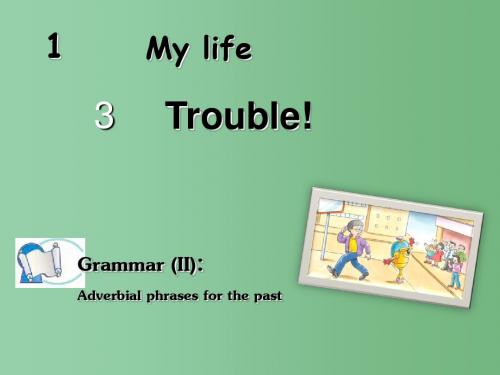
6-1
Using ago
The word ago refers to a period of time before now. It always es after the time word(s).
I passed my driving test six months ago. Vicky wrote to the pany weeks ago. David first met Melanie a long time ago. —Have you see Emma? —Yes, just a few minutes ago.
123456
6-5
Here are some examples with ‘night’.
I woke up in the night. (= at midnight) It happened on Monday night. I couldn’t sleep at night.
123456
6-6
in + part of a day in the morning in the evening
123456
in + a week or longer times
in the Christmas holiday in the spring term
6-3
Using on with time
on + a day in a week/date
We do not use in, on or at before these words:
every last next this tomorrow yesterday We go to Hong Kong every summer. My brother came home last Christmas. I’ll see you next Friday. I leave school this year. The party is tomorrow evening. The group set off yesterday morning.
牛津上海版(试用本)八年级英语上册单元检测卷Module 1 Unit 3 (word版含答案解析)
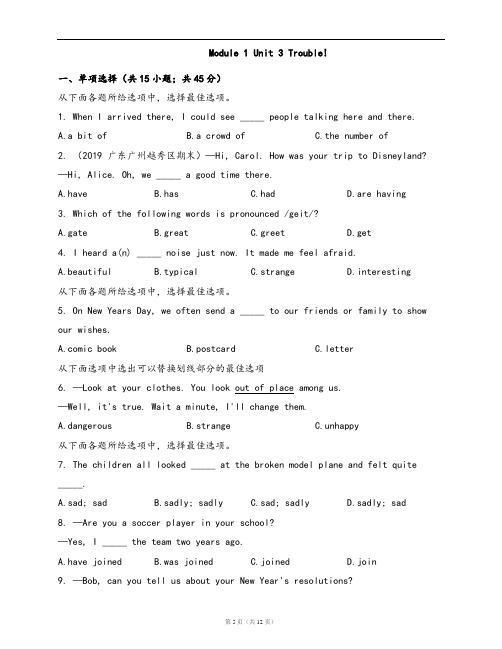
Module 1 Unit 3 Trouble!一、单项选择(共15小题;共45分)从下面各题所给选项中,选择最佳选项。
1. When I arrived there, I could see _____ people talking here and there.A.a bit ofB.a crowd ofC.the number of2. (2019 广东广州越秀区期末)—Hi, Carol. How was your trip to Disneyland? —Hi, Alice. Oh, we _____ a good time there.A.haveB.hasC.hadD.are having3. Which of the following words is pronounced /geit/?A.gateB.greatC.greetD.get4. I heard a(n) _____ noise just now. It made me feel afraid.A.beautifulB.typicalC.strangeD.interesting从下面各题所给选项中,选择最佳选项。
5. On New Years Day, we often send a _____ to our friends or family to show our wishes.ic bookB.postcardC.letter从下面选项中选出可以替换划线部分的最佳选项6. —Look at your clothes. You look out of place among us.—Well, it's true. Wait a minute, I'll change them.A.dangerousB.strangeC.unhappy从下面各题所给选项中,选择最佳选项。
7. The children all looked _____ at the broken model plane and felt quite _____.A.sad; sadB.sadly; sadlyC.sad; sadlyD.sadly; sad8. —Are you a soccer player in your school?—Yes, I _____ the team two years ago.A.have joinedB.was joinedC.joinedD.join9. —Bob, can you tell us about your New Year's resolutions?—I'm not _____ about it yet.A.relaxedB.interestingC.sureD.personal10. —Why did you _____ just now?—I _____ to look at the flower.A.stop, stoppedB.stop, stopedC.stop, stop11. This bus doesn't go to the train station. I'm afraid you'll have to _____ at the library and take the A52.A.take offB.put offC.get offD.turn off12. —Have you _____ been to Dalian?—Yes, I have.A.neverB.alreadyC.everD.yet13. My father and I _____ my grandparents last weekend.A.visitedB.visitC.visits14. —I stayed at home with my grandma last weekend. What about you?—I _____ to the park and _____ football.A.go, playB.went, playedC.went, play15. —What did you do yesterday afternoon at home?—I _____ my room and _____ something else.A.cleaned, doB.clean, didC.cleaned, did二、完形填空(共1小题;共40分)阅读下面的短文,掌握其大意,然后从短文后各题所给的选项中,选择最佳选项。
Unit+3+reading+课件+2023-2024学年牛津上海版(试用本)八年级英语上册

• Who did it happen to? Two women tourists and a young man
• Why did the two women and the young man
shout at each other at first? The two women found that the three young man stole a purse from them.
(c) 1
(b) 5-7
(e) 10-11
(a) 2-4
(d) 8-9
now
c. Paul and his father saw a man and
two women arguing at the ferry.
d. Paul's father quickly phoned the police.
e. The police met the ferry when it arrived and caught the man.
walk through ???
✓ What did one of the women say about the young man?
adv. silently
What happens?
✓ What did the young man do after the gates open?
adv. get on a ship, train, bus or a plane
hurry (v.)/(n.) hurry aboard
✓ What did the two women tourists do then?
go after ≈ follow
Байду номын сангаас
Unit+3+listening+and课+2023-2024学年牛津上海版(试用本)八年级英语上册
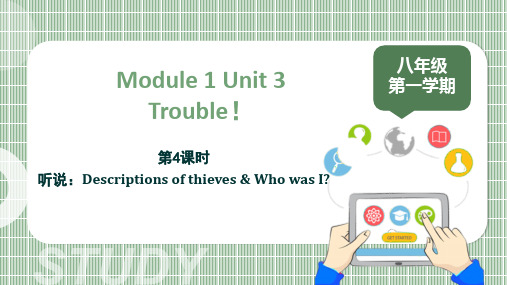
Build thin
(11)_t_h_i_n_
Hair
black and (2)_b_r_o_w_n__ in colour, (12)_s_h_o_r_t_ hair;
quite (3)_lo_n_g__ hair, over
black baseball (13)__c_a_p___
his (4)__ea_r_s___
3
While-listening
Listen to the dialogue and complete the table.
Age
about 25
about (9)_2_0__
Height quite (1)__ta_l_l___
rather (10)_sh__o_rt_ /ˈrɑːðə(r)/
old, (16)_w__h_it_e__ sports shoes
4
Post-listening Look and find thPe orteh-err etwaodtihniegves.
5
Speaking
Describe the twoPtrheie-vrees.ading
He was about 25 years old. He was quite tall and very thin. His hair is black and brown in colour. It was quite long and over his ears. He was wearing a white T-shirt. It had some writing on it and he was wearing a pair of old blue jeans. He had black shoes.
Module 1 Unit3 Trouble教案(6课时)牛津上海版(试用本)八年级上册

5.What number did he dial ? Why?
dial v. dialed dialed
dial a number拨电话号码
6. What did Paul’s father want to report?
7. What did he ask the police to do?
The teacher is standing amonga crowd ofchildren. (一群)
stare at凝视,盯着
She was staring at the strange object.
1. Deal with trouble.
2.They were waiting for the ferry.
Post-task activity
Practise reading
Homework
Blackboard Design
strange?奇怪的,陌生的stranger n.陌生人
be afraid of害怕
dial v. dialed dialed
dial a number拨电话号码
初中英语课堂教学设计
3.What werethewomen doing in the bookstore?
4.What did the young men start doing ?
5. What did one women suddenly notice?
notice—noticed—noticed v.注意到n.通知,标记
What’s going on ?------------ What’s happening?
牛津上海8年级上册 Unit3 Trouble重要知识点及语法点复习

U3 Trouble 重点词汇重点词汇拓展7.deal with 处理what to do with= how to deal with 如何处理8.trouble n.问题,困难have trouble (in) doing sth.= have problems/ difficulty (in) doing sth. 做某事有困难9.stare v.盯着看stare at sth. 盯着……看glance n./v. 瞥一眼glance at 看一下,浏览10.through prep.穿过(从内部)walk through the cityacross prep.穿过(从表面)walk across the grassover prep.越过(上方)There is a bridge over a river.11.put down 放下put off 推迟put up 举起;张贴put out 扑灭(火)12.fight v./ n.打架(fought, fought)fight with sb. = have a fight with sb.和某人打架fight for sth. 为……斗争13.realize v. 意识到;实现realize= come true 实现I realized my dream.= My dream came true.【课堂小练】Ⅰ .在下列句子中填入适当单词,首字母已给出l. She was a of upsetting her parents.2. They didn’t give any d about the game.3. I took a coin out of my p and gave it to the children.4. I want to get there early to avoid the c .5. My wallet was s.6. We drove through the palace g .7. When and where did the car accidents h?8. He pushed his way t the crowd.Ⅰ.用所给单词的适当形式填空l. The police found the lost boy.(quick)2. We had an with the waiter about the bill.(argue)3. He sent me some from the United Nations. (postcard)4. Then my friend noticed that her purse was not in her handbag. (sudden)5. She is to earn over $ 10 million a year.(report)6.1t’s not for young doctors to work a 70-hour week. They are always busy.(usual)7.They away when they saw us coming.(run)8.The students are reading newspapers and magazines in the reading room.(quiet)重点短语1. deal with trouble 处理麻烦have trouble in doing sth. 在……方面有困难have trouble with sth. 某事有困难2. hear a big argument 听见一阵争吵声3. two women tourists 两名女游客4. shout at each other 相互叫嚷5. hold out a bag 拿出一只包hold on 稍等6. stare at the crowd 看着人群7. move through the crowd 穿过人群8. go after him 跟着他(= follow him)9. hurry aboard 匆忙登上甲板10. be afraid of the man 怕那个人11. give more details 给出更多的细节in detail 详细地12. want to report a theft 想举报一起偷窃事件13. look worried 看起来很着急14. tell the police the truth 告诉警察真相15. telephone his wife 打电话给他的妻子16. run towards the car 朝小轿车跑过来17. walk by 走过去18. lift something up 把……拎起来19. see a robbery 看见一起抢劫事件20. remember arresting a thief in a clothes shop记得在一家服装店逮捕过一名小偷21. hide a yellow sweater inside his coat 把一件黄色分毛衣藏在他的大衣里面22. release him 把他释放23. write on the back of the envelope 在信封的背面写到24. receive a telephone call from the teller 收到收纳员的一通电话25. smuggle some rare birds from Thailand into Australia从泰国走私一些珍稀动物到澳大利亚去26. get on the ferry 上渡船27. happen to do sth. 遭到,遇到28. Well done! 干得好!29. fight for freedom 为自由而战30. What’s going on? = What is up? = What is happening? 发生什么事了?31. would rather do sth. 宁愿做某事would rather not do sth. 宁愿不做某事【课堂小练】词组默写1.______________ 一次激烈的争吵2. ______________ 女游客(复数)3.______________瞪着4.______________ 开始和我们搭讪5.______________=go aboard in a hurry6.______________看到某人正在做某事7.______________看到某人做某事8.______________ 尾随9.______________看上去很焦虑10.______________ 下(船)重点句型1. Which city do you want to go to?【知识链接】该句的疑问词which作go to的宾语,不能使用where。
牛津上海版英语八年级上册《Unit 3 Trouble!》说课稿2
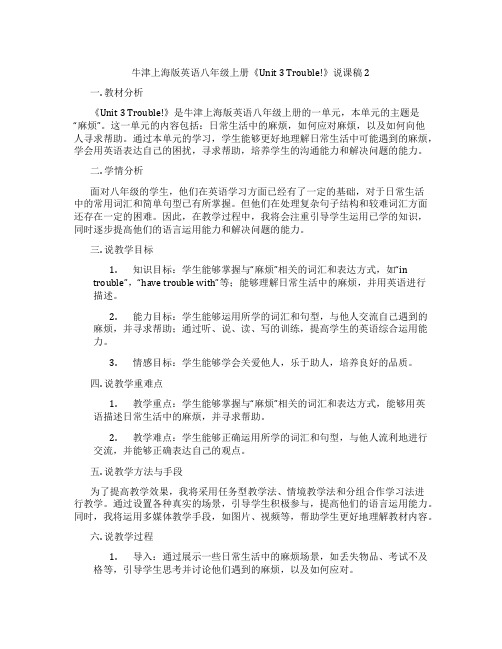
牛津上海版英语八年级上册《Unit 3 Trouble!》说课稿2一. 教材分析《Unit 3 Trouble!》是牛津上海版英语八年级上册的一单元,本单元的主题是“麻烦”。
这一单元的内容包括:日常生活中的麻烦,如何应对麻烦,以及如何向他人寻求帮助。
通过本单元的学习,学生能够更好地理解日常生活中可能遇到的麻烦,学会用英语表达自己的困扰,寻求帮助,培养学生的沟通能力和解决问题的能力。
二. 学情分析面对八年级的学生,他们在英语学习方面已经有了一定的基础,对于日常生活中的常用词汇和简单句型已有所掌握。
但他们在处理复杂句子结构和较难词汇方面还存在一定的困难。
因此,在教学过程中,我将会注重引导学生运用已学的知识,同时逐步提高他们的语言运用能力和解决问题的能力。
三. 说教学目标1.知识目标:学生能够掌握与“麻烦”相关的词汇和表达方式,如“introuble”,“have trouble with”等;能够理解日常生活中的麻烦,并用英语进行描述。
2.能力目标:学生能够运用所学的词汇和句型,与他人交流自己遇到的麻烦,并寻求帮助;通过听、说、读、写的训练,提高学生的英语综合运用能力。
3.情感目标:学生能够学会关爱他人,乐于助人,培养良好的品质。
四. 说教学重难点1.教学重点:学生能够掌握与“麻烦”相关的词汇和表达方式,能够用英语描述日常生活中的麻烦,并寻求帮助。
2.教学难点:学生能够正确运用所学的词汇和句型,与他人流利地进行交流,并能够正确表达自己的观点。
五. 说教学方法与手段为了提高教学效果,我将采用任务型教学法、情境教学法和分组合作学习法进行教学。
通过设置各种真实的场景,引导学生积极参与,提高他们的语言运用能力。
同时,我将运用多媒体教学手段,如图片、视频等,帮助学生更好地理解教材内容。
六. 说教学过程1.导入:通过展示一些日常生活中的麻烦场景,如丢失物品、考试不及格等,引导学生思考并讨论他们遇到的麻烦,以及如何应对。
牛津上海版英语八年级上册《Unit 3 Trouble!》教学设计4

牛津上海版英语八年级上册《Unit 3 Trouble!》教学设计4一. 教材分析《Unit 3 Trouble!》是牛津上海版英语八年级上册的一单元,本单元主要围绕“麻烦”这个主题展开,通过学习本单元,学生能够掌握一些与麻烦相关的词汇和表达方式,并能运用所学知识进行简单的交流和表达。
教材中包含了一个故事、几个对话和一些练习,内容丰富且贴近学生的生活。
二. 学情分析八年级的学生已经具备了一定的英语基础,能够听、说、读、写一些简单的英语句子。
但部分学生对英语学习的兴趣不高,学习积极性有待提高。
此外,学生的英语水平参差不齐,因此在教学过程中需要因材施教,尽量让每个学生都能参与到课堂活动中来。
三. 教学目标1.知识目标:学生能够掌握与麻烦相关的词汇和表达方式,如“havetrouble with”、“in trouble”等;2.能力目标:学生能够听懂、会说、会读、会写与麻烦相关的话题,具备简单的交流和表达能力;3.情感目标:学生能够学会在面对麻烦时保持积极乐观的态度,学会寻求帮助和解决问题。
四. 教学重难点1.重点:学生能够掌握与麻烦相关的词汇和表达方式;2.难点:学生能够运用所学知识进行简单的交流和表达,特别是在实际生活中的应用。
五. 教学方法1.任务型教学法:通过设置各种任务,让学生在完成任务的过程中学习和运用英语;2.情境教学法:创设真实的语境,让学生在特定的情境中学习和运用英语;3.交际法:鼓励学生进行互动交流,提高他们的口语表达能力。
六. 教学准备1.准备相关课件和教学素材;2.准备一些与麻烦相关的问题和情境;3.准备录音机、磁带或其他音频播放设备。
七. 教学过程1.导入(5分钟)利用音频播放一段与麻烦相关的情景,引导学生关注本节课的主题。
2.呈现(10分钟)展示本节课的主要词汇和表达方式,如“have trouble with”、“in trouble”等,并通过例句让学生理解其含义。
3.操练(10分钟)设计一些练习,让学生分组进行角色扮演,运用所学知识进行交流。
牛津上海版八年级上册 Unit 3 Trouble 说课稿
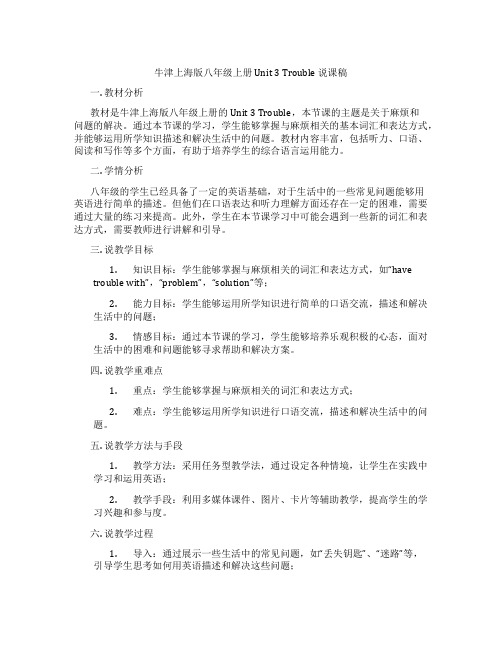
牛津上海版八年级上册 Unit 3 Trouble 说课稿一. 教材分析教材是牛津上海版八年级上册的Unit 3 Trouble,本节课的主题是关于麻烦和问题的解决。
通过本节课的学习,学生能够掌握与麻烦相关的基本词汇和表达方式,并能够运用所学知识描述和解决生活中的问题。
教材内容丰富,包括听力、口语、阅读和写作等多个方面,有助于培养学生的综合语言运用能力。
二. 学情分析八年级的学生已经具备了一定的英语基础,对于生活中的一些常见问题能够用英语进行简单的描述。
但他们在口语表达和听力理解方面还存在一定的困难,需要通过大量的练习来提高。
此外,学生在本节课学习中可能会遇到一些新的词汇和表达方式,需要教师进行讲解和引导。
三. 说教学目标1.知识目标:学生能够掌握与麻烦相关的词汇和表达方式,如“havetrouble with”,“problem”,“solution”等;2.能力目标:学生能够运用所学知识进行简单的口语交流,描述和解决生活中的问题;3.情感目标:通过本节课的学习,学生能够培养乐观积极的心态,面对生活中的困难和问题能够寻求帮助和解决方案。
四. 说教学重难点1.重点:学生能够掌握与麻烦相关的词汇和表达方式;2.难点:学生能够运用所学知识进行口语交流,描述和解决生活中的问题。
五. 说教学方法与手段1.教学方法:采用任务型教学法,通过设定各种情境,让学生在实践中学习和运用英语;2.教学手段:利用多媒体课件、图片、卡片等辅助教学,提高学生的学习兴趣和参与度。
六. 说教学过程1.导入:通过展示一些生活中的常见问题,如“丢失钥匙”、“迷路”等,引导学生思考如何用英语描述和解决这些问题;2.新课呈现:讲解与麻烦相关的词汇和表达方式,如“have troublewith”,“problem”,“solution”等,并通过例句和情景进行巩固;3.口语练习:通过角色扮演、小组讨论等形式,让学生练习运用所学知识进行口语交流,描述和解决生活中的问题;4.阅读理解:阅读一篇关于解决问题的短文,学生能够理解文章内容,并回答相关问题;5.写作练习:让学生写一篇关于解决生活中问题的短文,培养学生运用所学知识进行写作的能力;6.总结:对本节课所学内容进行总结,强调重点词汇和表达方式;7.作业布置:让学生课后用英语描述和解决一个生活中的问题,提高学生的实际运用能力。
八年级英语上册 Module 1 My life Unit 3 Trouble wor
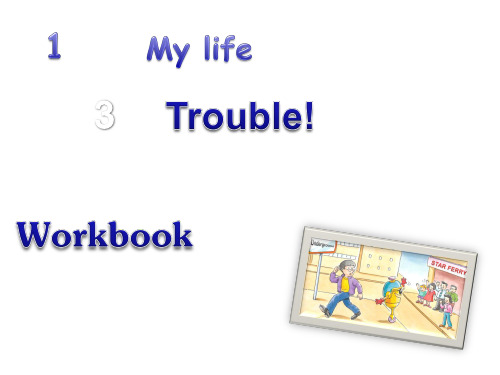
I went to Sunshine Shopping Centre last Saturday. Suddenly I saw something on the floor. It was a (1)____________. A man picked it up. I (2)____________ at him for a few seconds and (3)____________ that he put the purse into his pocket. Then he (4)____________ towards the underground station. ‘That’s (5)____________,’ I thought. ‘It was a woman’s purse. That man took it. He is not an honest person!’
I saw a policeman and I (6)____________ it to him. I also gave him some details about the man. He said, ‘Thank you very much. I’ll (7)____________ with it.’ Soon another policeman came. Then I followed them into the underground station.
Write the correct past tense form of these verbs.
shout __________
八年级上册英语沪教牛津Module1Unit3trouble!(reading)_22
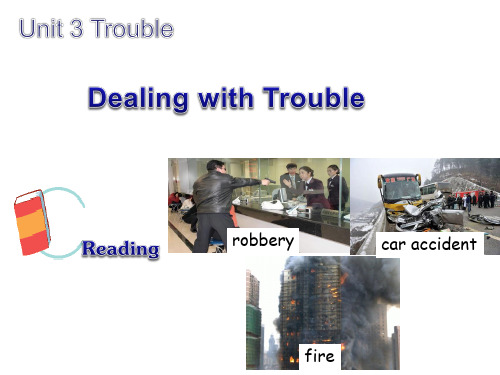
in the bookshop. men _______ 2.He didn’t want
2.They _______ to the women to ______ the
that the purse ___ tourists in the ferry.
_______.
bookshop.
3.He hurried to a
steal v.
stole,stolen
thief n.
theft n.
go after = follow v.
purse n.
a small bag that you keep money in
Fill in the blanks with the correct words.
deal with, dial, stare, aboard, steal, purse, crowd, argue
bookshop.
about 20 years old,
black hair, a shirt with green checks, a pair of black trousers, a bag in his hand
The man was caught. What do you think of Paul’s father? Brave and clever.
八年级英语上册 Module 1 My life Unit 3 Trouble Grammar 1课件 (新版)牛津上海版

Ling: (a)__________ the weather bad? (be) Leo: Yes. A strong wind (b)__________. (come) Ling: (c)__________ it __________ down your tents? (blow) Leo: Yes, it (d)__________ down all our tents. (blow)
Paul: ______, we _________ on it with him.
5 Julia: ______ you _________ what your dad was going to do? (know)
Paul: ______, I _____________ what he was going to do.
6 Julia: ______ the police _________ the ferry in time? (meet)
Paul: ______, they _________ it in time.
A2 Julia is asking some more questions. Complete the questions and answers with information from the diary. Use the verbs in brackets and yes or no. Use one or more words as required.
Ling: What happened? Leo: I (a)__________ my sunglasses.
(drop) Ling: (b)__________ they __________?
「精品」八年级英语上册Module1MylifeUnit3TroubleReading课件牛津上海版-精品资料
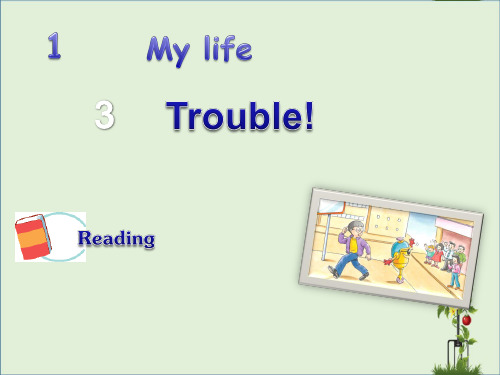
Bob the robber stole 12 things from these people. Can you name the things in his sack? Can you say who he stole each thing from?
Example: He stole a ball from the dog.
Friday, 28 June Today my dad and l were waiting for the ferry when suddenly we heard a big argument. Two women tourists and a young man were shouting at each other. The man held out a bag, and showed everyone that it was empty.
We went across the river on the (9)__________ ferry. The police were already there! The man looked (10)__________. My dad helped those two women. He was really great!
‘They stole my friend’s purse,’ said the woman. ‘We were in the bookshop, buying postcards. Three young men started talking to us. Suddenly my friend noticed that her purse was gone. Two of the men ran away. We followed this man here.’
- 1、下载文档前请自行甄别文档内容的完整性,平台不提供额外的编辑、内容补充、找答案等附加服务。
- 2、"仅部分预览"的文档,不可在线预览部分如存在完整性等问题,可反馈申请退款(可完整预览的文档不适用该条件!)。
- 3、如文档侵犯您的权益,请联系客服反馈,我们会尽快为您处理(人工客服工作时间:9:00-18:30)。
at home and watch some TV?
How did you spend your
What TV programmes were on?
evening?
3 At noon
Did you do some school
Where did you have lunch?
work?
How was the food?
their diaries? 3 What tense do people usually
use when writing a diary?
C Before we write our own diaries, we are going to complete an entry from Judy’s diary. Look at the picture on the right and answer the two questions below. 1 Who came in the morning?
1 What was the date last Sunday? 4 In the afternoon
2 In the morning
What did you do?
When did you get up?
Did anything exciting
What did you do?
happen?
Did you go somewhere or did you stay 5 In the evening
Verbs climb take run
come be
start fall
Other words helicopter money surprised into
out of up to
What happened to you last Sunday? Use the questions to help you. Then write your own diary. Remember to use the simple past tense.
A Read Paul’s diary on page 39 again. The introduction section says that Paul is writing about an unusual thing that happened to him one day. What is the unusual thing?
B We are going to learn to write diaries in this lesson. Can you answer the following questions about diaries?
1 What is a diary? 2 What do people usually write in
2 What did he give to Judy?
Now you are Judy. Every day you
write a diary. Yesterday was your
birthday, and you saw a robbery.
A Work in pairs. Complete the sentences by using the pictures and the words in the boxes. Remember to put the verbs into the simple past tense.
Verbs be go (out) give eat come
Other words the afternoon delicious a present the morning a lot of a radio
B Work alone complete Judy’s diary entry for yesterday.
What time did you go to
Did you have lunch with your family?
bed?
Date: __________ In the morning, _______________________________________________ ________________________________________________ __________ ________________________________________________ __________ At noon, ________________________________________________ ____ ________________________________________________ __________ ________________________________________________ __________
